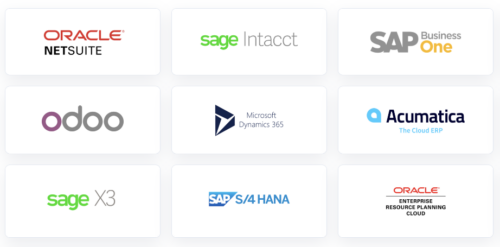Introduction to 10 Best ERP Software – In today’s dynamic business landscape, companies are constantly seeking ways to streamline their operations and enhance productivity. Enterprise Resource Planning (ERP) software has emerged as a powerful solution to integrate various business processes into a single, cohesive system.
ERP software enables businesses to manage resources, automate tasks, and improve decision-making processes.
Factors to Consider When Choosing 10 Best ERP Software
When selecting an ERP software solution, several critical factors must be taken into account to ensure that it aligns with the specific needs and goals of the organization. Scalability, customization options, integration capabilities, user-friendliness, and cost-effectiveness are among the key considerations.
Top 10 ERP Software Solutions
1. SAP Business One
SAP Business One is a comprehensive ERP solution designed for small to medium-sized businesses. It offers features such as financial management, CRM, inventory management, and analytics, all in a single platform.
2. Oracle NetSuite
Oracle NetSuite is a cloud-based ERP system that provides a broad range of functionalities, including financial management, supply chain management, and e-commerce. It is highly customizable and scalable, making it suitable for businesses of all sizes.
3. Microsoft Dynamics 365
Microsoft Dynamics 365 offers a suite of ERP applications that integrate seamlessly with other Microsoft products such as Office 365 and Azure. It provides modules for finance, sales, marketing, and customer service, enabling organizations to streamline their operations and drive growth.
4. Sage Intacct
Sage Intacct is a cloud-based ERP solution designed specifically for finance professionals. It offers advanced features for accounting, budgeting, and reporting, helping businesses gain real-time insights into their financial performance.
5. Infor CloudSuite
Infor CloudSuite is a robust ERP platform that caters to various industries, including manufacturing, distribution, and healthcare. It provides modules for enterprise asset management, human capital management, and supply chain optimization.
6. Epicor ERP
Epicor ERP is a flexible and scalable solution suitable for businesses of all sizes. It offers comprehensive functionalities for industries such as manufacturing, retail, and distribution, empowering organizations to drive efficiency and innovation.
7. SYSPRO
SYSPRO is an industry-specific ERP system tailored for manufacturing and distribution companies. It provides features for inventory management, production planning, and quality control, helping businesses streamline their operations and reduce costs.
8. Acumatica Cloud ERP
Acumatica Cloud ERP is a cloud-native solution that offers flexibility and scalability for growing businesses. It provides modules for financial management, project accounting, and CRM, allowing organizations to manage their operations more effectively.
9. Plex Systems
Plex Systems is a cloud-based ERP platform designed for the manufacturing industry. It offers features such as production management, quality control, and supply chain visibility, enabling manufacturers to optimize their processes and drive growth.
10. IQMS
IQMS is a comprehensive ERP system that caters to the unique needs of manufacturers. It provides modules for enterprise resource planning, manufacturing execution, and supply chain management, helping businesses improve efficiency and competitiveness.
Features and Benefits of Each ERP Software
Each of the top 10 ERP software solutions offers unique features and benefits that cater to different business requirements. From advanced analytics and reporting capabilities to seamless integration with third-party applications, these ERP systems empower organizations to streamline their operations and achieve their goals more effectively.
Case Studies or Success Stories
Numerous businesses across various industries have successfully implemented ERP software to drive growth and innovation. Case studies and success stories showcase how companies have leveraged ERP solutions to optimize their processes, improve efficiency, and enhance customer satisfaction.
Comparison Table
A detailed comparison table highlighting the key features, advantages, and pricing models of the top 10 ERP software solutions is provided below:
[table id=1 /]
Conclusion
Choosing the right ERP software is crucial for businesses looking to streamline their operations, improve efficiency, and drive growth. By considering factors such as scalability, customization options, and integration capabilities, organizations can select an ERP solution that aligns with their unique needs and goals.
Frequently Asked Questions (FAQs)
What is ERP software, and why is it important for businesses?
ERP software integrates various business processes into a single, cohesive system, enabling organizations to streamline their operations, automate tasks, and improve decision-making processes.
How do I know which ERP software is best for my business?
When choosing ERP software, consider factors such as scalability, customization options, integration capabilities, user-friendliness, and cost-effectiveness to ensure it aligns with your specific needs and goals.
Are there any free ERP software solutions available?
While there are some open-source ERP software solutions available for free, they may lack advanced features and support compared to paid options. It’s essential to evaluate the features and functionality offered before making a decision.
Can ERP software be customized to fit specific business needs?
Yes, many ERP software solutions offer customization options to tailor the system to the unique requirements of your business. This ensures that you can adapt the software to suit your processes and workflows effectively.
How long does it typically take to implement ERP software?
The implementation time for ERP software varies depending on factors such as the size of the organization, the complexity of business processes, and the chosen ERP solution. On average, it can take several months to a year to fully implement and integrate ERP software into an organization’s operations.
